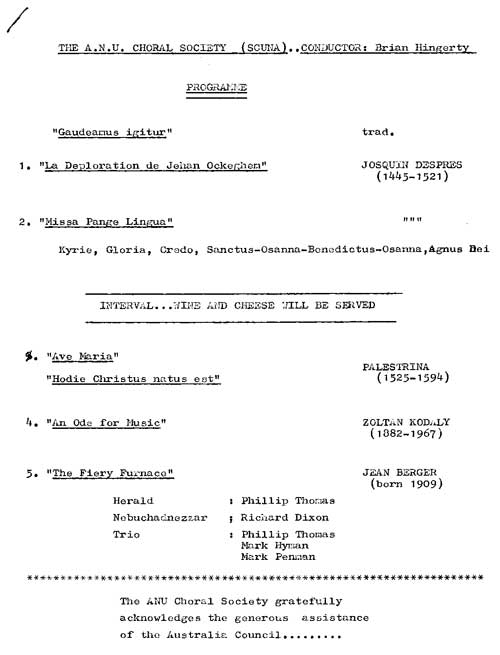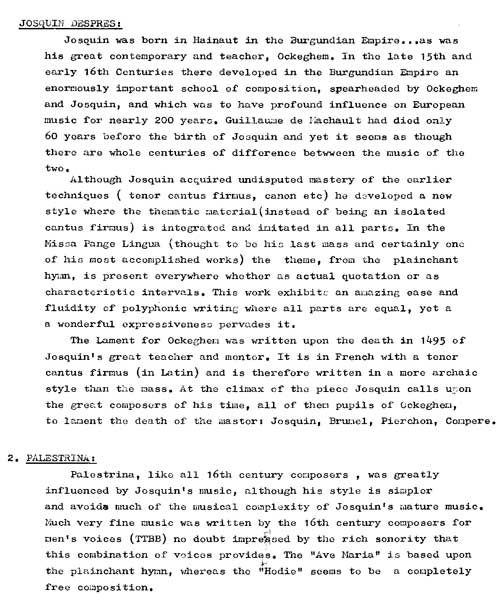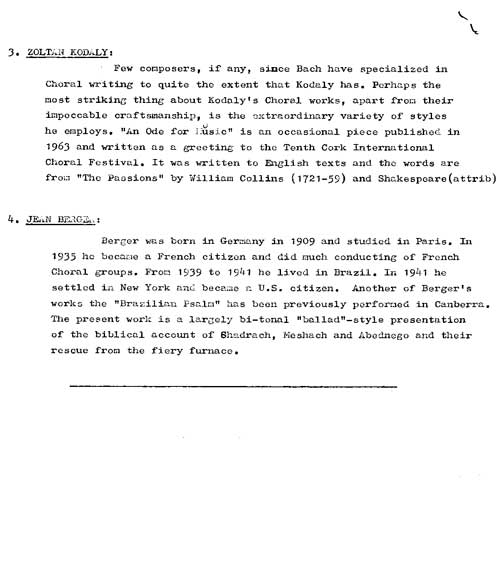
Third Term Concert
11 October 1975
University House
SCUNA history » Concerts » 1975 Term 3
Programme
Page 1

| |
THE A.N.U. CHORAL SOCIETY (SCUNA) |
CONDUCTOR: Brian Hingerty |
| PROGRAMME |
| |
"Gaudeamus igitur" |
trad. |
| 1. |
"La Deploration de Johan Ockeghem" |
JOSQUIN DESPRES
(1445-1521) |
| 2. |
"Missa Pange Lingua" |
""" |
| |
Kyrie, Gloria, Credo, Sanctus-Osanna-Benedictus-Osanna, Agnus Dei |
_______________________________________________
INTERVAL...WINE AND CHEESE WILL BE SERVED
_______________________________________________ |
| 3. |
"Ave maria"
"Hodie Christus natus est" |
PALESTRINA
(1525-1594) |
| 4. |
"An Ode for Music" |
ZOLTAN KODALY
(1882-1967) |
| 5. |
"The Fiery Furnace" |
JEAN BERGER
(born 1909) |
| |
Herald: |
Phillip Thomas |
| |
Nebuchadnezzar: |
Richard Dixon |
| |
Trio: |
Phillip Thomas
Mark Hyman
Mark Penman |
| ******************************************************************** |
| The ANU Choral Society gratefully acknowledges the generous assistance of the Australia Council......... |
Page 2
JOSQUIN DESPRES
Josquin was born in Hainaut in the Burgundian Empire...as was his great contemporary and teacher, Ockeghem. In the late 15th and early 16th Centuries there developed in the Burgundian Empire an enormously important school of composition, spearheaded by Ockeghem and Josquin, and which was to have profound influence on European music for nearly 200 years. Guillaume de Machault had died only 60 years before the birth of Josquin and yet it seems as though there are whole centuries of difference between the music of the two.
Although Josquin acquired undisputed mastery of the earlier techniques (tenor cantus firmus, canon etc) he developed a new style where the thematic material (instead of being an isolated cantus firmus) is integratcd and imitated in all parts. In the Missa Pange Lingua (thought to be his last mass and certainly one of his most accomplished works) the theme, from the plainchant hymn, is present everywhere whether as actual quotation or as characteristic intervals. This work exhibits an amazing ease and fluidity of polyphonic writing where all parts are equal, yet a a wonderful expressiveness pervades it.
The Lament for Ockeghem was written upon the death in 1495 of Josquin's great teacher and mentor. It is in French with a tenor cantus firmus (in Latin) and is therefore written in a more archaic style than the mass. At the climax of the piece Josquin calls upon the great composers of his time, all of them pupils of Ockeghem, to lament the death of the master: Josquin, Brumel, Pierchon, Compere.
2. PALESTRINA
Palestrina, like all 16th century composers, was greatly influenced by Josquin's music, although his style is simpler and avoids much of the musical complexity of Josquin's mature music. Much very fine music was written by the 16th century composers for men's voices (TTBB) no doubt impressed by the rich sonority that this combination of voices provides. The "Ave Maria" is based upon the plainchant hymn, whereas the "Hodie" seems to be a completely free composition.
Page 3
3. ZOLTAN KODALY
Few composers, if any, since Bach have specialized in Choral writing to quite the extent that Kodaly has. Perhaps the most striking thing about Kodaly's Choral works, apart from their impeccable craftsmanship, is the extraordinary variety of styles he employs. "An Ode for Music" is an occasional piece published in 1963 and written as a greeting to the Tenth Cork International Choral Festival. It was written to English texts and the words are from "The Passions" by William Collins (1721-59) and Shakespeare (attrib.).
4. JEAN BERGER
Berger was born in Germany in 1909 and studied in Paris. In 1935 he became a French citizen and did much conducting of French Choral groups. From 1939 to 1941 he lived in Brazil. In 1941 he settled in New York and became a U.S. citizen. Another of Berger's works the "Brazilian Psalm" has been previously performed in Canberra. The present work is a largely bi-tonal "ballad"-style presentation of the biblical account of Shadrach, Meshach and Abednego and their rescue from the fiery furnace.
Note
Like many concert programmes, this one is undated. (Concert organisers: consider posterity! Please include full dates on programmes and posters!) In the register of SCUNA concerts started by Jeff Christensen and continued by Michael Sawer, Jeff has listed a concert consisting of Palestrina's Missa Brevis and Berger's Fiery Furnace, and Michael has added "11/10/75 3rd term concert". In 2010, Robert Taylor supplied a poster which confirms Michael's information and tells us that the concert was at University House.
See also Poster
Next - 1975 Christmas Concert |
SCUNA concerts |
SCUNA history |
Page created 21 November 2004; last updated 01 February 2014
SCUNA: home page |
Val: home page



